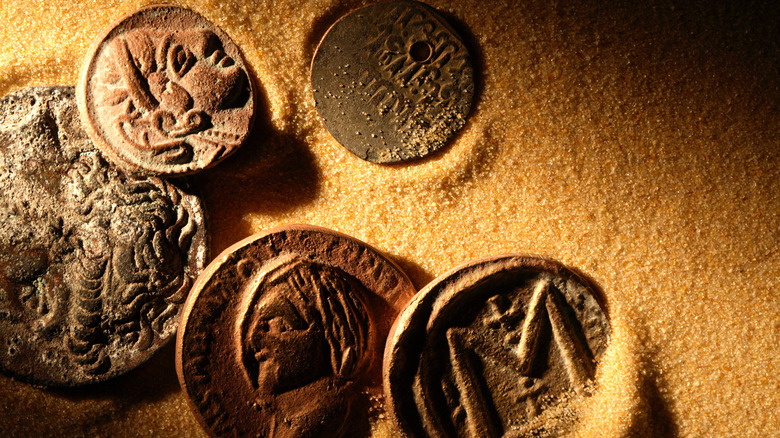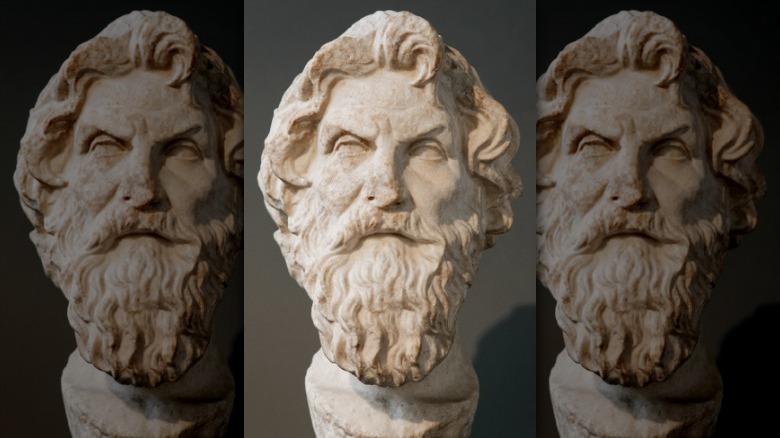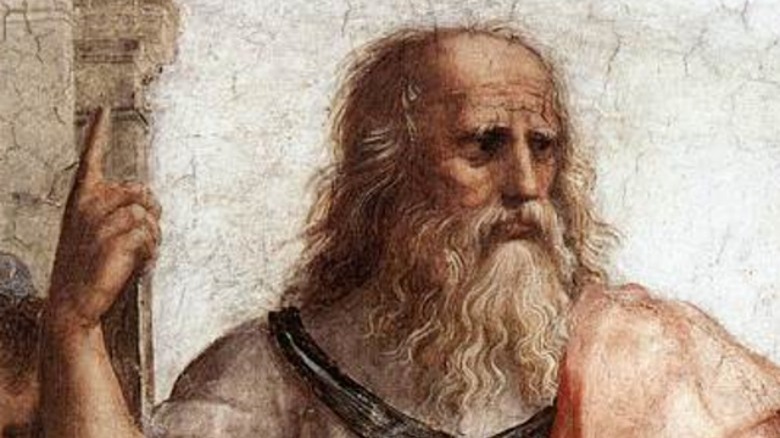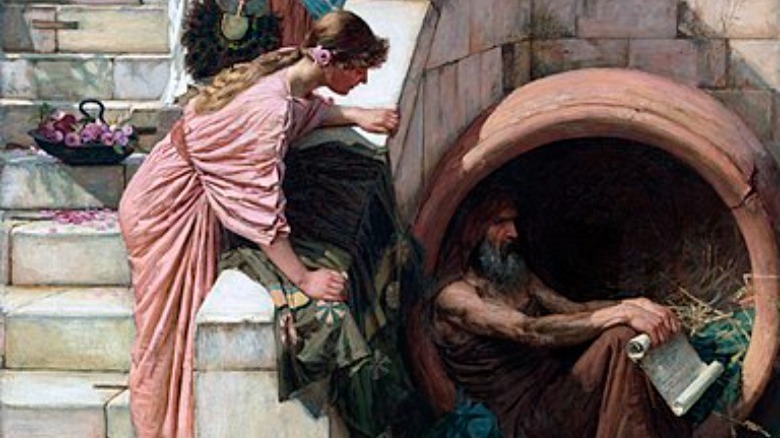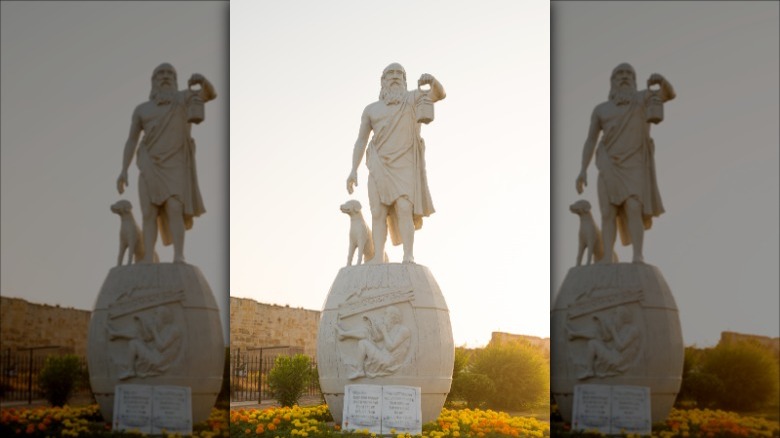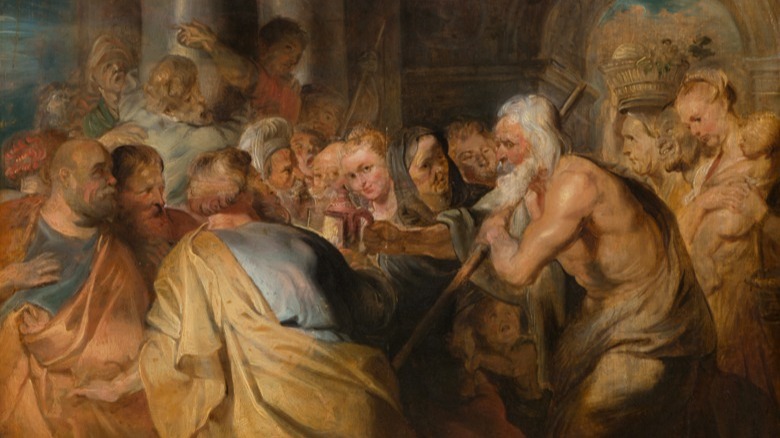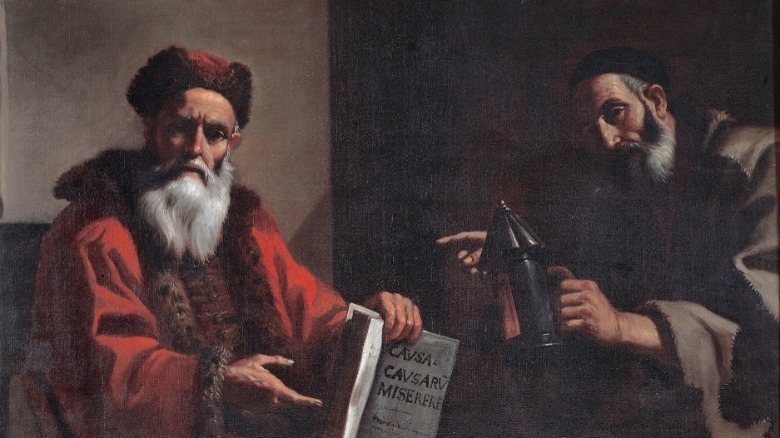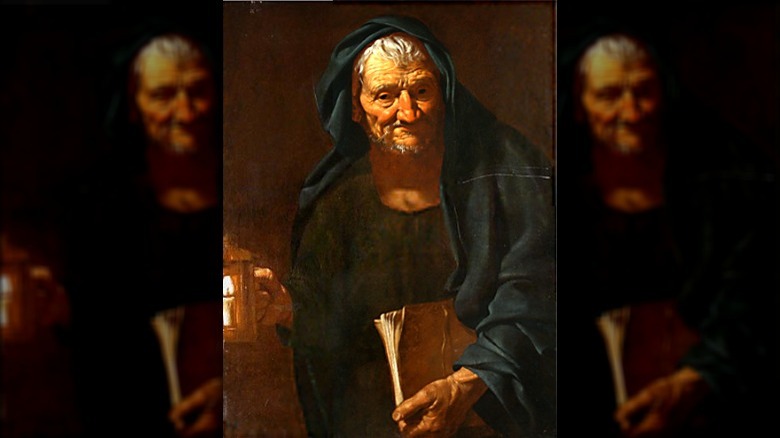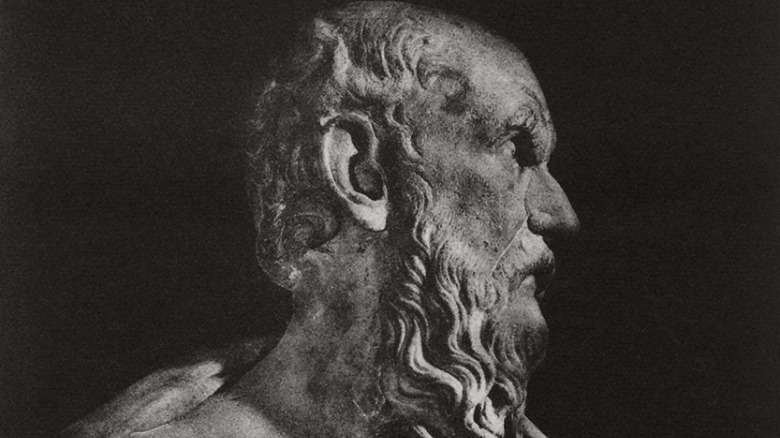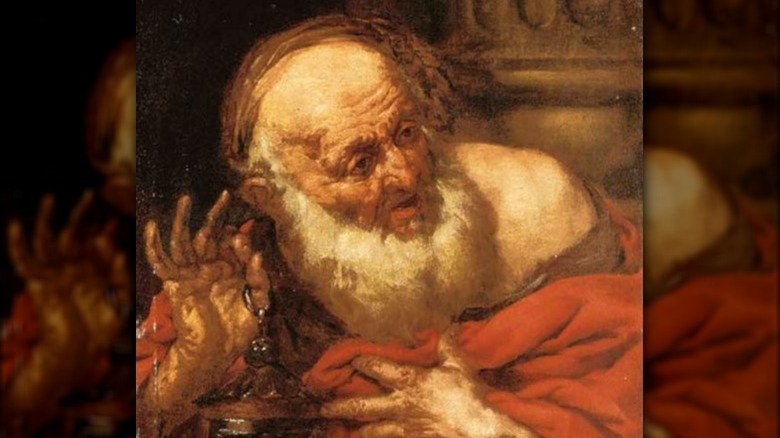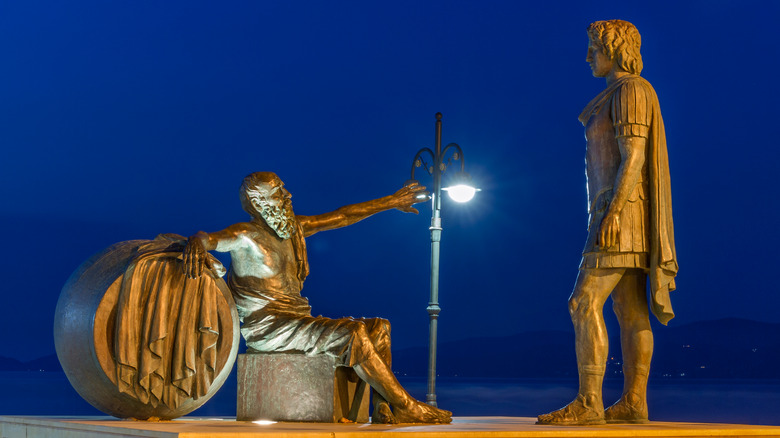Diogenes: The Strange Story Of Plato's Rival
Diogenes of Sinope was born in what is now modern-day Turkey around 400 B.C., in the generation after the great philosopher Socrates, and practiced philosophy in the milieu of famous contemporaries such as Plato. Though he is remembered as one of the most prominent practitioners of the philosophy of cynicism, he is notable for being something of an outsider among the ancient philosophers.
The life of Diogenes was chronicled by many biographers and historians in the years after his death sometime around 323 B.C. Sadly, many of these original sources — assuming, in fact, that they were original — have been lost to the winds of time. Nevertheless, one definitive account of Diogenes' life remains a touchstone for those investigating the philosopher: that written by another Diogenes, the great Greek biographer of ancient philosophers, Diogenes Laërtius.
Laërtius' "Lives of Eminent Philosophers" gives us the earliest full account of Diogenes' life. However, many of the details are taken wholesale from other texts, now lost, which Laërtius refers to as if they were common and well-known works. The validity of many of the texts in question is unverifiable, but nevertheless, they have been instrumental in painting a picture of the life of Diogenes for millennia.
A shady early life
Many ancient philosophers are revered for their moral standing and their lifelong exhibition of the virtues they espoused in their lessons. Diogenes, however, was no conventional philosopher, as the details of his early life — which, understandably, are somewhat hazy despite Diogenes' influence and fame — also show.
According to Diogenes Laërtius, the future philosopher came from a wealthy family in Sinope, a Greek colony and city in what is now modern-day Turkey. His father, Hicesius, was a banker in the city, and it seems that Diogenes was due to live a privileged life in Sinopean society. However, a certain calamity meant that Diogenes, Hicesius, and the rest of Diogenes' family were forced into exile, after which Diogenes gravitated toward Athens, which would become his home and the cradle of his legend.
Per Laërtius, Diogenes and his family left Sinope after Hicesius "adulterated" the coinage of the state — i.e., mixed the precious metal of the coins with lower-grade metals, thus devaluing them — that had been entrusted to Hicesius, who was a banker. The truth of the matter is still debated, however, as Laërtius claims that other chroniclers accused Diogenes himself of the adulteration — presumably, a synonym for forgery. In some accounts, it is reported that Hicesius was imprisoned and died as a result of his son's actions.
Diogenes the fanboy
That Diogenes emerged in Athens following the scandal that drove him from Sinope meant that he found himself in one of the cultural powerhouses of the ancient world. As such, the intelligent young man soon found himself coming into contact with some of the greatest philosophical minds of his day.
At the time, the city was filled with the burgeoning schools of the now mature students of the great philosopher Socrates, according to the World History Encyclopedia. One of the most prominent of these was Antisthenes (pictured), who, adapting what he had learned from Socrates, developed his own philosophy which came to be known as cynicism (also per the World History Encyclopedia). As reported by Diogenes Laërtius, it was to Antisthenes that Diogenes of Sinope gravitated upon his arrival in Athens. The young exile quickly began attempting to convince Antisthenes to become his mentor, just as Socrates has mentored Antisthenes. However, according to Laërtius, the elder man was loath to take on students of any kind, preferring to maintain his freedom to devote himself to philosophical thought.
It is reported, however, that Diogenes hassled Antisthenes so consistently that he eventually broke his resistance and gained his philosophical mentor. However, some historians have suggested this is a dubious claim, noting disparities between Antisthenes' date of death and Diogenes' arrival in Athens, per the Internet Encyclopedia of Philosophy.
A cynical lifestyle
Whether Diogenes of Sinope was indeed the direct student of Antisthenes or not, his eccentric life as a famous figure on the streets of Athens revealed him to be the full living embodiment of Antisthenes' teachings: the ultimate philosophical cynic is name and deed.
As noted by the Internet Encyclopedia of Philosophy, Diogenes inherited from Antisthenes a lifelong practice of asceticism — namely, he endeavored to live as simply and frugally as possible, even if that meant going against societal convention in the process. Diogenes gave away the vast majority of his possessions, keeping only that which was truly necessary. In one famous anecdote recounted by Laërtius, Diogenes witnesses a young child scooping handfuls of drinking water from a fountain. Proclaiming that "a child has beaten me in plainness of living," Diogenes then discards one of his few possessions, a drinking cup, realizing that true asceticism meant living without one.
Diogenes also developed a reputation for having a sharp tongue, and he scorned other schools of philosophy as strongly as he embraced his own form of cynicism. As Laërtius recounts, Diogenes publicly denounced the works of elder philosophical rivals, including students of Socrates such as Euclides — "bilious," in the words of Diogenes — and even Plato. In return, Plato described Diogenes of Sinope as "a Socrates gone mad."
An unusual home
Diogenes of Sinope took lessons in how to live a simple, unadorned, ascetic life not just from the people of Athens, but also from the animals with which he came into contact. Wild creatures, Diogenes believed, showed great adaptability to their surroundings, and Laërtius claims that the life of the humble mouse was identified as a shining example of plain living. In the same spirit, Diogenes took to eating, sleeping, and living his life in the moment, wherever he happened to be at the time.
As Laërtius also recounts, the philosopher abandoned plans to buy a conventional home on his arrival in Athens. Instead, he took to living in a "pithos," a kind of tub or barrel, on the streets of the city, which he rolled from place to place as and when he required it, behavior also described in the Internet Encyclopedia of Philosophy and immortalized in famous paintings by John William Waterhouse (above) and Jean-Léon Gérôme (top image).
A philosopher's four-legged friends
But rodents weren't the only creatures inhabiting the streets of Athens that Diogenes of Sinope grew to know and respect. There is one animal that has come to be associated with the influential cynic more than any other: the dog.
That street dogs became the symbol of both Diogenes and a life of cynicism is easily graspable: Canines are humble, possessionless, and live a hand-to-mouth existence outside of human society. But to Diogenes, dogs were also respectable for their justifiable aggression. "Other dogs bite their enemies, but I bite my friends, so as to save them," Diogenes said, according to New Humanist. The same source also claims that, if the philosopher was ever derided by the people of Athens and treated as if he were an actual dog — by throwing bones at him instead of giving him food, for instance — then the philosopher would have no qualms about living up to his image, and would urinate against the legs of those who did him harm.
A meeting with Alexander the Great
New Humanist recounts the life of Diogenes of Sinope as one of subversion, of both the stuffy conventions of Athenian society and of authority in general — a living out of his cynical ethics that questioned every assumption about what it means for human beings to live well.
Diogenes' most famous brush with authority is said to have come when he received a particularly colossal visitor to his humble pithos: Alexander the Great. According to the academic P.R. Bosman, writing in the journal Acta Classica, a version of the meeting is recounted by Diogenes Laërtius, while another famous version is found in the writings of the Roman orator Cicero, written around 45 B.C. In Cicero's retelling, Alexander visits Diogenes and offers to give him anything he wants, to which the ascetic replies to the man casting a shadow over him: "Just now ... stand a bit away from the sun." The dual suggestion is that Diogenes is in need of nothing, and that he is impressed by no power, however great.
However, as Bosman points out, though the story is one of the most famous anecdotes of antiquity and says much about chroniclers' attitudes toward the world views of both Diogenes of Sinope and of Alexander the Great down the centuries, scholars tend to question its authenticity as an account of a true-to-life meeting between the two figures. Rather, the story is likely to be apocryphal, and a symbolic demonstration of the attitude with which cynicism as a philosophy deals with power more than anything else.
Fish, farts, and the subversion of shame
Most typical members of society might feel a sense of shame and regret at having been encountered by such a figure as Alexander the Great while living in such an animalistic state. But for Diogenes of Sinope, shamelessness is an essential aspect of a life of true cynicism.
Shamelessness — like cynicism itself — has overtly negative connotations as a word in the 21st century. But the truth is that Diogenes purposefully cultivated shamelessness, believing that the shedding of shame could lead to a life free of the stranglehold of societal conventions that might prevent one from living authentically. The shedding of shame, the cynic believed, could come through self-debasement and the willingness to disgust members of the society that would castigate you.
Per New Humanist, Diogenes encouraged his long-suffering students to carry foul-smelling items on their person, such as over-matured cheese or rotting fish, to strip them of their sense of respectability. Similarly, Diogenes was said to openly fart in public, and even defecate in front of audiences who attended his lectures, turning adoration into outrage.
The lamp of Diogenes
As well as his barrel home and his dog companions, Diogenes of Sinope is recognizable in works of art by an object he always carries: a lamp.
It may be surprising that Diogenes chose to avail himself of a lamp while he was willing to dispense with other seemingly essential possessions such as cups, bowls, and even conventional housing. But for Diogenes, the lamp was more than a practical item: It was a symbol of his attitude toward human society. As the chronicles of Diogenes Laërtius explain, the great cynic did not only use his lamp at night to guide his way; he also had it lit throughout the day when its light was of no use to him. Diogenes was once questioned as to why he used his lamp in so wasteful and impractical a manner, to which he reportedly replied: "I am looking for a man," or, in other words, an authentic human being.
The implication, as the Internet Encyclopedia of Philosophy explains, is that humans in conventional society are not living authentically, with nature, as animals like dogs and mice do, but are caught up in the trappings of lives as demarcated for them by authority. Through cynicism, however, it might be possible to escape these bounds, using Diogenes' own life to demonstrate this in extremis.
A quick-witted cynic
As the previous examples have shown, Diogenes of Sinope was not shy when it came to letting the people of Athens know exactly what he thought about the society of the day, how people thought, and the more conventional thinkers who shared the attention of the Athenians.
The most famous of Diogenes' philosophical rivals today is undoubtedly Plato, whose writings are also the primary source for the teachings of his great mentor Socrates. Plato has had a profound effect on human thought down the millennia ... but even he, it turns out, could have an off-day when it came to giving the world watertight philosophy. According to Diogenes Laërtius, Plato once gave a lecture in which he defined a human being as "an animal, bipedal, and featherless." Though Plato's definition reportedly drew the agreement of the crowd, Diogenes left, and soon returned with a plucked bird, stating: "Here is Plato's man."
The chronicles tell of many instances where Diogenes revealed his quick wit and unconventional view of life. In old age, the philosopher was once told by a friend that he ought to slow down and not run himself into an early grave. He replied: "if I were running in the stadium, ought I to slacken my pace when approaching the goal?"
Was Diogenes enslaved?
As previously discussed, the facts of the life of Diogenes of Sinope are difficult to ascertain. The best-known anecdotes concerning his most famous actions and interactions are impossible to verify for certain, mingling as they do with invented stories intended as pedagogic aids to the understanding of the cynicism he expounded.
One contested story that is told about Diogenes involves the philosopher being sold into slavery, an account of which, according to Diogenes Laërtius, was originally found in a chronicle written by the philosopher Menippus, which has now been lost, if it ever existed. According to Laërtius, Diogenes was once sailing to Aegina when his ship was assailed by a band of pirates, who captured him and took him to Crete to be sold to a master. Ever defiant, Diogenes told the auctioneer in charge of his sale that the task he should take as a slave should be "ruling men." He then identified a man in the crowd, and said: "Sell me to this man; he needs a master." The story goes that the subversive cynic then essentially took over the running of the man's home in Corinth and became the teacher of his children.
As satisfying and in keeping with Diogenes' character as the story is, many scholars question its authenticity, as noted by the Internet Encyclopedia of Philosophy.
The lost writings of Diogenes
Though Diogenes of Sinope is now held up as a central figure of philosophical cynicism, the fact is that the supposedly prolific philosopher's written works have survived in what might be considered their original form, and now come down to us second-hand.
Part of the reason for this was Diogenes' own attitude toward the written word. As recounted by Diogenes Laërtius in "Lives of the Eminent Philosophers," Diogenes was once asked by a fellow philosopher, Hegesias of Cyrene, whether he could loan him a selection of his work in written form. Diogenes' response says much about how he preferred his ideas to be transmitted. "You are a simpleton, Hegesias," he said. "You do not choose painted figs, but real ones; and yet you pass over the true training and would apply yourself to written rules."
Diogenes believed that the oral tradition, by which cynicism might be spread by lectures, dialogues, and word-of-mouth, was enough to keep his beliefs alive in the minds of his students and admirers; the Internet Encyclopedia of Philosophy claims some historians doubt whether the philosopher ever wrote anything down at all. Thankfully, his thoughts and actions have, in part, been immortalized by chroniclers such as Laërtius.
Diogenes' many deaths
As with the early life of Diogenes, there are many versions of the details of his death in circulation across a variety of sources, and as might be expected, some accounts are particularly fitting for a philosopher who lived such a strange and singular life.
As described in "Lives of the Eminent Philosophers," which assembled various accounts of Diogenes' death from sources that are now believed to be lost, the philosopher was said to have lived to the ripe old age of 90. Famously, Diogenes was unfussy when it came to what he ate, and one account claims that his death came as a result of eating raw octopus. Meanwhile, another chronicler had reportedly claimed that Diogenes' fraternization with street dogs was his eventual undoing: the lost source claimed that one of the philosopher's dogs bit the elderly Diogenes, after which he died of rabies (via the World History Encyclopedia).
The most fitting account of how the defiant Diogenes died, however, says that his cause of death was a simple one: that he held his breath until he expired.
Cynicism in the modern world
It may not seem that a 2,000-year-old philosophy espousing self-imposed hardship and the relinquishing of possessions and comfort would have much value in the 21st century. However, as the Western world grapples with many potentially calamitous issues, it seems that cynicism is having a moment as people look for radical ways to challenge the hierarchies that maintain an unfair status quo.
As noted by Molly Anne Rothenberg of Tulane University, the word "cynicism" is used more strikingly today to describe a wave of self-interest and corruption that dominates much of Western politics and public life. She points out that the philosophical cynicism espoused by Diogenes of Sinope was, in many ways, the opposite of what the word demarks for many people today, encompassing an ethical stance that values honesty, openness, humanity, and speaking truth to power. Rothenberg's article, "Why We Need Cynicism Now," reflects a growing interest in Diogenes' philosophy, as people look for frameworks with which to negotiate the chaos of internet discourse and the modern world.

